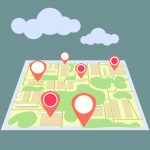Geolocation
Where are you, right now? Of course, you know the answer to this question (I assume!), but how many other people are privy to your exact location?

Family? Close friends? Acquaintances? Strangers?
Your phone?
Yes, your phone. Geolocation – a term which here means your exact location – can be determined by a number of means (GPS, wi-fi proximity, etc.) and is increasingly used by a variety of electronic devices in order to perform the services they offer. Your computer and phone are the most ready examples, but even within them, many of the individual apps you use may access your geolocation in order to perform their function.
This can make life very convenient. Turn-by-turn directions use geolocation. So do apps like GoogleMaps. It can help find nearby restaurants or shopping and track your evening jog around the neighborhood. It can even help you play certain games like – dare I say it – Pokemon Go. Some social apps (like Snapchat) allow all those following you to see your location on a map at all times (“Oh look! John is here at the mall too!”).
This, of course, brings us to the privacy concerns associated with geolocation. First, the obvious. Depending on who is following you on social media, you might not want them to know where you are at all times. If misused, geolocation is a perfect tool for stalkers and thieves who might want to know just where to find you…or when you’re not at home. But even if you limit who has this information through apps like Snapchat, there are other ways you may inadvertently give away your geolocation.
For example: ever post a selfie to Facebook? Unless location services are turned off, your phone automatically tags photos you take with geolocation data (called geotagging). Anyone viewing that picture you just took and posted of yourself at the baseball game (or mall or park or wherever) can use that picture to find out exactly where you are.
So, what should you do to protect your location privacy? Much of that has to do with your own comfort level and circumstances, but here are some possible actions you can take to protect your geolocation data:
- Provide geolocation access only to apps that you trust and that need the functionality. This is actually not just a tip, but a best-practice, no-brainer.
- Take a look at your social media accounts’ privacy settings and adjust geolocation sharing to your comfort level.
- Disable your camera or photo app from geotagging your pictures.
- When you share pictures from your camera choose to “share without metadata” whenever possible to avoid posting information such as geotagging.
- Finally, you can simply turn off geolocation completely (see below) when you’re not using it or at least in situations where privacy may be paramount.
- In some cases these things can be achieved by the simple push of a button (such as putting your phone in airplane mode). There’s lots of “how-to” information out there, but the following links are good places to start for iOS and Android users who want to manage their geolocation tracking.
iOS: https://www.lifewire.com/turn-location-services-on-ipad-4103808
Android: https://www.androidpit.com/how-to-stop-android-apps-accessing-your-location
Remember, however, that this is a trade-off. Despite the privacy concerns, there are many very useful services provided via geolocation on your phone and if location services is turned off, these obviously won’t function. So be aware of the risk and choose appropriately depending on your comfort level.
